People in both countries remain committed to transatlantic security
In 2017, Pew Research Center and Körber-Stiftung began collaborating on joint public opinion surveys to gauge the state of relations between the United States and Germany. The questions were developed together, and each organization fielded a survey within its own country starting that year. Some of the questions have been repeated annually to allow both organizations to track attitudes over time. Topics include relations with other countries, the state of the transatlantic partnership on a variety of foreign policy issues, views of China and Russia, and the state of international relations.
The results have been published in both countries, and the previous reports from Pew Research Center can be found here for November 2021, September 2020, May 2020, and March 2020, 2019 and 2018.
The Körber-Stiftung findings are contained within their larger “Berlin Pulse” report and can be found here for 2022 and prior years.
The U.S. findings come from a Pew Research Center survey conducted from July 18 to Aug. 21, 2022, among 12,147 respondents online and Aug. 1-14, 2022, among 7,647 respondents online. German findings are from a Körber-Stiftung survey conducted by Kantar from Aug. 2-11, 2022, among 1,088 respondents via telephone.
Here are the questions used for this report, along with the responses, and its U.S. survey methodology.
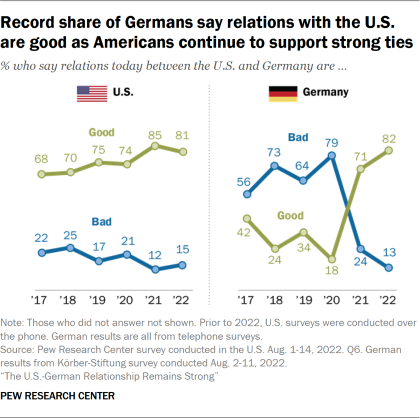
As daunting challenges from Russia, China and a flagging global economy ripple across the world, Americans and Germans continue to say that relations between their countries are good. In fact, more Germans now say that the relationship with the United States is good (82%) than have since 2017, when Pew Research Center and Körber-Stiftung began asking about the issue. For their part, 81% of Americans also characterize the transatlantic relationship as good, but there remain differences between the two nations on specific aspects of the partnership and on perceptions of what threat if any is posed by Russia and China.
Most Americans and Germans continue to see each other as partners on protecting European security, and publics in each country are willing to support using military action to protect themselves and their allies. Majorities in each country also see the other as a good partner on dealing with Russia. Germans, however, are more skeptical about how a U.S. partnership can protect the environment, while Americans are relatively less convinced that Germany is a partner when it comes to dealing with China.
Democrats and Democratic-leaning independents tend to say Germany is more of a partner on a variety of issues than do Republicans and those who lean toward the Republican Party. People in both countries also think that Europe is not doing enough to become independent from Russian energy as a looming winter threatens to stretch European energy supplies.
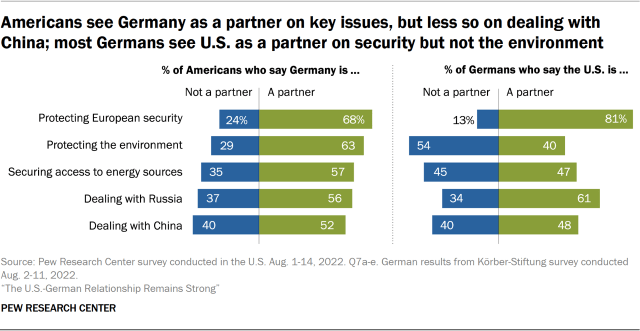
Germans are more likely to say that the U.S. is their preeminent foreign policy partner, even as Americans are inclined to name the United Kingdom is their most important partner (the survey was conducted before the recent passing of Queen Elizabeth II). Americans for their part are also much more likely than Germans to see Russia and China as a military threat to their country. Older Americans are especially likely to see Russia and China as major military threats.
As to one of the more direct effects of Russia’s invasion of Ukraine, both Americans and Germans strongly support Sweden and Finland joining NATO (60% and 75%, respectively). Germans are also much more likely to say they want a close relationship with the U.S. rather than Russia or China. But both publics express skepticism of using their militaries to promote democracy, and neither fully supports only purchasing energy supplies from nations that are democracies.
These are among the findings from a Pew Research Center survey of 12,147 people in the U.S. from July 18-Aug. 21 and 7,647 people in the U.S. from Aug. 1-14, 2022, as well as a Körber-Stiftung survey of 1,088 adults conducted in Germany from Aug. 2-11, 2022. This is the first year the American survey has been conducted online on Pew Research Center’s American Trends Panel. In prior years, from 2017 to 2021, U.S. surveys were conducted via telephone. Additional results from the Körber-Stiftung survey can be found with the newly released “Berlin Pulse” publication. The German surveys were conducted entirely via phone in all years, including 2022.
The bilateral relationship between the U.S. and Germany
Both Americans and Germans are overwhelmingly positive about current bilateral relations, with large majorities in both countries considering relations somewhat or very good in 2022.
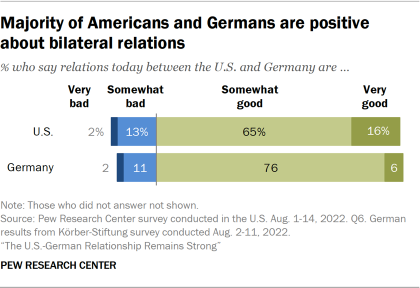
Germans became substantially more optimistic about bilateral relations in 2021, after leadership changes in both countries. Positive sentiment has continued to rise in Germany, where a record share of 82% now say that relations with the U.S. are good. This represents an 11 percentage point increase from last year and more than a quadrupling in positive evaluations over the past two years.
Americans’ assessments of the relationship also improved significantly in 2021 and remain overwhelmingly positive this year. Overall, Democrats and Republicans have similar sentiments about whether relations are Germany are good (84% and 80%, respectively), but Democrats are more intensely positive about the relationship. Notably, Democrats and Democratic-leaning independents are more than twice as likely to say relations with Germany are very good (22% vs. 10%).
The American-German partnership on key issues
Roughly half or more of Americans say Germany is a partner in all five key issues tested, with 68% calling Germany a partner in protecting European security. Around six-in-ten Americans also say that Germany is a partner on protecting the environment and securing access to energy sources. However, only 56% and 52% of Americans call Germany a partner in dealing with Russia and China, respectively.
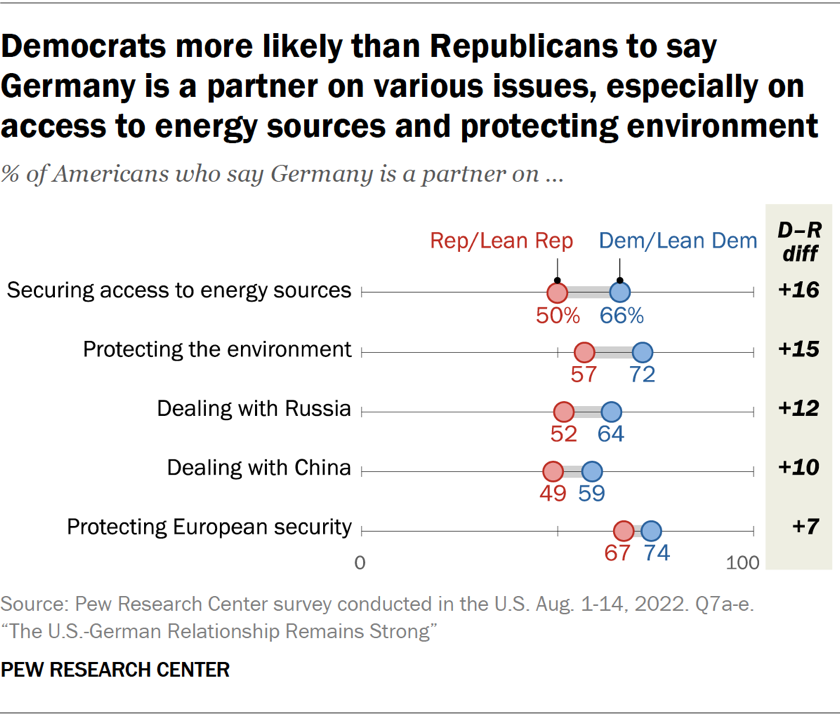
While majorities of Republicans and Republican-leaning independents consider Germany a partner on nearly all issues, Democrats and Democratic-leaning independents are more likely to say they consider Germany a partner on every issue tested. This divide is greatest for securing access to energy sources and protecting the environment.
Large shares of Germans consider the U.S. a partner on two key issues: About eight-in-ten Germans say the U.S. is a partner in protecting European security, and around six-in-ten describe the U.S. as a partner in dealing with Russia.
Germans are split over whether the U.S. is a partner in securing access to energy sources. Nearly half of Germans surveyed consider the U.S. a partner on energy, while 45% say they do not consider the U.S. a partner. Although a slight increase from 2021, only 48% of Germans say the U.S. is a partner in dealing with China, and just 40% say the U.S. is a partner in protecting the environment.
In addition, younger Germans are more critical of the partnership with the U.S. on the environment (59% say the U.S. is not a partner). And on all issues, those in former East Germany tend to be more critical of the partnership with the U.S. than those living in former West Germany. Politically, Green Party supporters are more likely to see the U.S. as a partner on dealing with China than those who support the Social Democratic Party (SPD) or CDU/CSU.
Most important foreign policy partner for U.S. and Germany
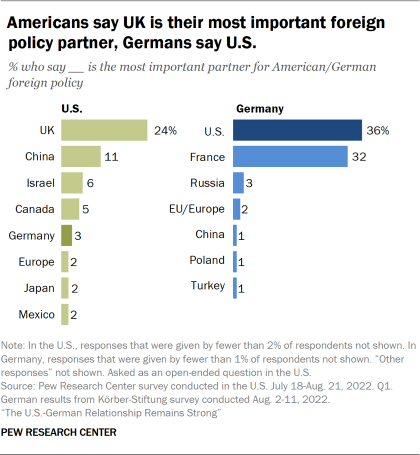
Although relations between the U.S. and Germany are on relatively solid footing, each public paints a different picture when naming its country’s most important foreign policy partner. Americans are much more likely to say that the United Kingdom is their nation’s most important foreign policy partner, which highlights the historical ties between the two English-speaking nations.
Around a quarter of Americans say the UK is the most important partner for American foreign policy. Next down on the list, 11% say China is America’s most important foreign policy partner, followed by 6% who cite Israel and 5% who choose Canada. Only 3% say Germany is America’s most important international partner, ranking it fifth in the open-ended question on this year’s survey. More than a third of U.S. panelists did not respond to this question.
Among Germans, the most critical foreign policy partner named is the U.S. at 36%, followed closely by France at 32%. Far behind those two traditional allies are Russia (3%), the European Union (2%), and China, Turkey and Poland (each 1%).
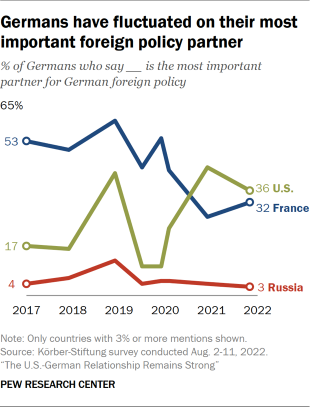
Comparisons to previous surveys in the U.S. are not possible due to a mode shift from phone to web panel in 2022, but similar patterns were seen among Americans on this question from 2017 to 2021, with the UK always on top and China usually coming in second.
In 2022, Republicans are far more likely than Democrats to cite Israel as a foreign policy partner. And Americans ages 18 to 29 rank China as the country’s most important partner on foreign policy, while older Americans overwhelmingly say the UK.
Demographic differences in Germany are not profound on their most important international partner, but those in former West Germany are more likely to name the U.S. as that most critical partner compared with those in the former East.
In 2020 and earlier, during Donald Trump’s presidency, most Germans chose France as their most important partner, with the U.S. typically coming in second. But since President Joe Biden has taken the helm, Germans have been much more likely to say the U.S. is their most important partner. This mirrors overall attitudes toward the U.S. and its president in Germany and Western Europe in other Pew Research Center polling and analysis over the past five years.
China and Russia as a military threat
Despite the fact that around one-in-ten Americans name China as their most important foreign policy partner, around two-thirds consider China a military threat to American security (64%). And similar shares say the same about Russia as a military threat (66%), as Americans continue to share concerns about Russia’s invasion of Ukraine.
On the other hand, a much smaller share of Germans say that either Russia or China is a major military threat to their security. Only about two-in-ten Germans say Russia is a major military threat (22%), and even fewer say the same about China (7%). This equates to Americans being three times as likely as Germans to express major concerns about Russia’s military, and roughly nine times as concerned about China. However, 44% of Germans see China as at least a minor military threat, and 72% say the same about Russia.
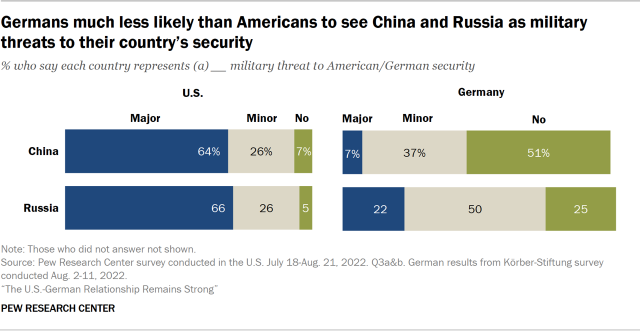
Older Americans are much more concerned about the potential military threat from China and Russia than are younger Americans. Age differences in Germany are not as dramatic, but older Germans do tend to see Russia as more of a military threat than younger Germans.
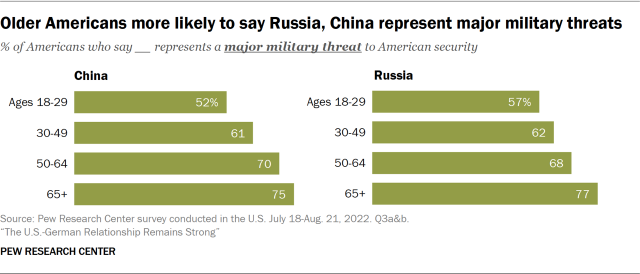
Republicans are more concerned about the military threat posed by China (75% say major military threat) than Democrats (58%), while Democrats are somewhat more likely to see Russia as a threat (69%) than Republicans (64%). This tracks with overall attitudes about China and Russia among supporters of the two major U.S. political parties.
Involvement of American and German military forces in foreign conflicts
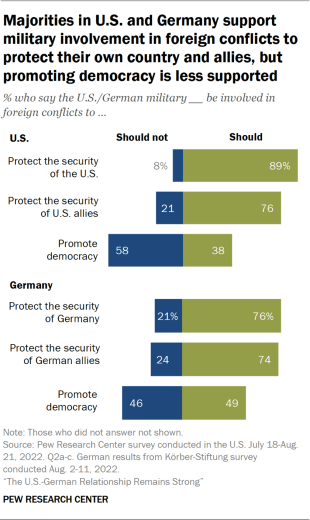
An overwhelming share of Americans and Germans alike believe their military should be utilized in foreign conflicts to protect the security of their own country and its allies. Nearly nine-in-ten Americans say the military should be involved to protect the security of the U.S., and about three-quarters say this about protecting American allies. Roughly three-quarters of Germans say the same about protecting themselves and Germany’s allies.
However, when it comes to using the military for the promotion of democracy abroad, a majority of Americans (58%) say the U.S. military should not be used for this purpose. Only 38% of Americans see a place for the military in democracy promotion abroad. This tracks with recent public opinion in the U.S., which ranks promoting democracy in other nations as the least important foreign policy priority.
Germans for their part are almost equally divided on using the German military for democratic expansion, with 49% saying they should and 46% saying should not.
Older Americans are more inclined to support democracy promotion via the military than younger Americans, although fewer than half of those 65 and older say this. Democrats are also slightly more likely than Republicans to say the U.S. military should bolster democracy abroad (42% vs. 35%, respectively).
NATO’s expansion
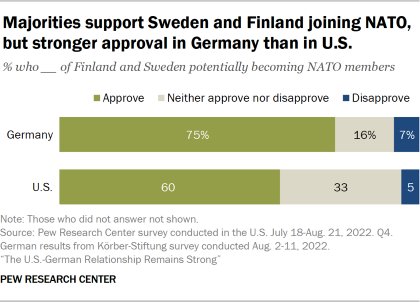
In reaction to the Russian invasion of Ukraine, Sweden and Finland have applied to become members in NATO, the North Atlantic Treaty Organization. While the application is still in the process of ratification by the 30 NATO member states, both the U.S. and Germany have approved the ascension. And publics in both countries wholeheartedly support the acceptance of Sweden and Finland into NATO, with few opposed.
Three-quarters of Germans say that they approve of Sweden and Finland potentially becoming NATO members, with six-in-ten Americans also approving. Fewer than one-in-ten in each country oppose the ascension. In the U.S., a third neither approve nor disapprove of the change in NATO membership, while 16% in Germany are neutral on the issue.
In Germany, support for NATO membership for Sweden and Finland is high across the major demographic groups. But slightly less support for the ascension is found among those in former East Germany (65%) compared with the West (78%). And older Germans are more approving of the potential expansion than younger Germans, although much of the difference is due to younger Germans being more likely to say they neither approve nor disapprove of the ascension rather than opposing it.
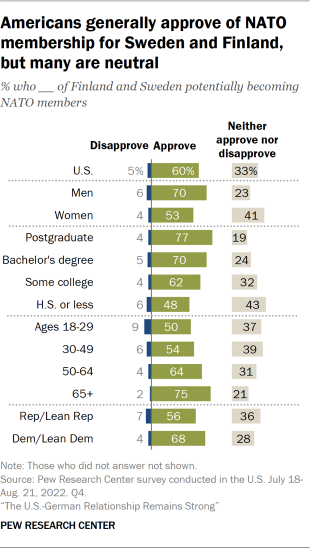
Similarly, Americans’ demographic differences on this question tend to be mainly between those who approve and those who remain neutral, with only small minorities disapproving. For example, seven-in-ten men say they approve of Finland and Sweden joining NATO compared with 53% of women. But this is due to 41% of women saying they neither approve nor disapprove of NATO membership for the Scandinavian nations, while only 23% of men say the same. (Women were also more likely to say they were unsure on questions about details of international affairs in a recent Pew Research Center survey on foreign policy knowledge.)
Those with more education and older Americans are also more likely to support NATO membership for Sweden and Finland. But again, much of the difference is due to younger and less educated Americans being more likely to say they neither approve nor disapprove of NATO’s expansion.
There are also slight partisan differences on this question, with Democrats more likely than Republicans to support Sweden and Finland joining NATO. This tracks with other polling on U.S. partisan attitudes toward NATO, which shows Democrats more favorable toward the organization than Republicans and more likely to see a benefit in membership.
Energy security
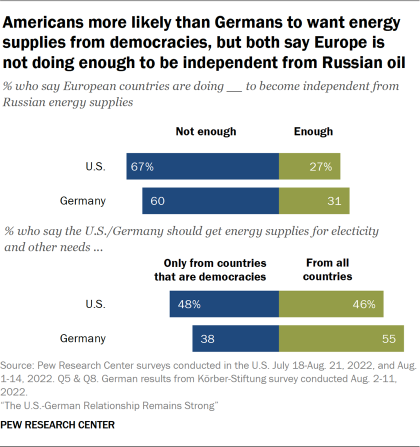
Russia’s invasion of Ukraine and the subsequent disruption to global energy markets has led to concerns about the looming winter and Europe’s ability to cope without Russia’s massive energy exports. To that end, two new questions were asked on this year’s survey about whether American and German publics would be willing to import energy from any country or just those that are democracies, and if Europe is doing enough to become independent from Russian energy supplies.
On the latter, it is clear people in the U.S. and Germany think European countries are not doing enough to divest themselves from Russian energy. Six-in-ten Germans and two-thirds of Americans say Europe is not doing enough to become independent from Russian gas and oil. Only about three-in-ten in each country say Europe is doing enough. In the U.S., younger people and Democrats are somewhat more likely to say Europe is doing enough compared with older people and Republicans, but most in all demographic categories think Europe is not doing enough to divest itself from Russian energy.
And on the broader question of importing energy from all countries or only those that are democracies, Americans are almost evenly split, while a majority of Germans say they should seek out energy markets from all countries, regardless of their political system. Interestingly, younger Germans are more willing to say they should only purchase energy supplies from democratic countries, while younger Americans are more willing to get energy from all countries.


